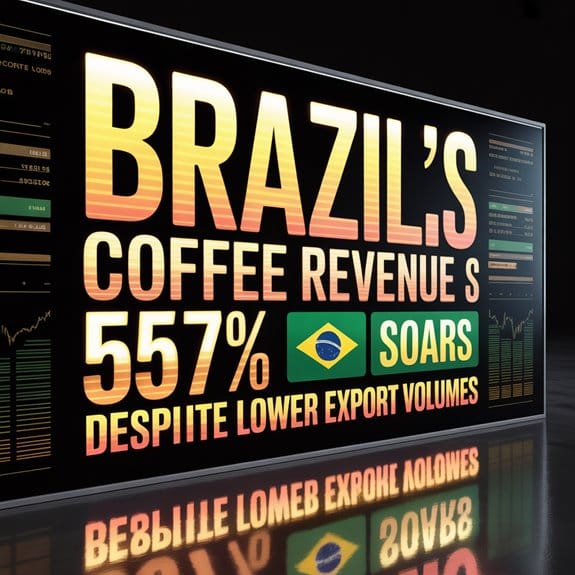Brazil’s coffee sector defied a 2% drop in export volumes to post record-breaking revenue of US$13.69 billion between July 2024 and May 2025, propelled by soaring global prices. Shipments fell to 42.96 million 60-kilogram bags during the period, but higher prices—averaging US$318.64 per bag—drove earnings to an all-time high. Moreover, this dramatic revenue surge highlights Brazil’s position as a leading producer of Arabica coffee in the global market.
Projections for the full 2025 coffee year suggest even stronger results, with export revenue forecast at R$125.7 billion (about US$24 billion), up 57% year-over-year.
Brazil’s 2025 coffee export revenue is forecast to surge 57% year-over-year, reaching R$125.7 billion (US$24 billion).
Arabica coffee dominated exports, making up 76.74% of total shipments at 32.97 million bags, despite a 6.6% production decline linked to drought in Minas Gerais, Brazil’s top coffee-producing state. Robusta (Conilon) and other varieties accounted for 14.19% of exports, including a record 18.7 million bags of Conilon.
Instant coffee made up 8.93% of exports, while roasted and ground coffee contributed less than 1%. Arabica’s revenue is projected at BRL 86.52 billion (71% of total), while Robusta is expected to generate BRL 36.18 billion.
Minas Gerais led regional production, forecast to earn BRL 62.93 billion—nearly half of Brazil’s coffee revenue. Espírito Santo followed with BRL 30.88 billion, driven by surging Conilon output (+28.2%), while São Paulo and Bahia contributed BRL 12.26 billion and BRL 9.81 billion, respectively. Bahia also reported record Conilon production.
Global prices played a key role, rising 78.4% year-over-year between January and April 2025. Higher demand and price recovery offset a 15.5% drop in export volume during that period, pushing revenue up 51%. Rising ICE inventories at 3.75 months for arabica and 8 months for robusta tempered bullish momentum despite tight supplies. Total export revenue climbed to US$13.69 billion from US$9.82 billion in the prior cycle.
However, domestic prices dipped in late May amid heavy harvests and inventory buildup. May shipments plummeted 33.3% to 2.93 million bags, but revenue still shattered records for the month at US$1.24 billion. Mechanization has enhanced efficiency, with more mid-sized farms adopting equipment to streamline harvesting and reduce labor reliance.
This shift improved bean quality and helped stabilize production despite drought impacts on Arabica. Although weather challenges remain, technological advances are softening their effects. Brazil’s ability to capitalize on high prices while managing output constraints highlights its resilience in a volatile global market.


